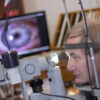Ever wondered what it takes to be an optician? Our dispensing manager Gareth Lehman looks at what the role entails and explains more about his career so far.
In order to be a qualified dispensing optician you must be professionally registered with The Association of British Dispensing Opticians (ABDO). ABDO represents over 6,000 qualified dispensing opticians in the United Kingdom. All of these professionals are regulated by the General Optical Council (GOC) and only dispensing opticians registered with GOC can practice in the UK and use the coveted title of dispensing optician.
All dispensing opticians are highly skilled professionals, they have the skills and knowledge to impart advice on a wide range of subjects. We give professional advice on lenses for night driving, ultra violet protection, occupational spectacles, prescription sunglasses, low vision aids and safety eyewear to name a few. A lot of colleagues in the industry go on to complete honours courses after the dispensing optician degree, such as low vision, spectacle design or contact lenses to become a Contact Lens Optician (CLO).
A day in the life of a dispensing optician is varied, no one day is ever the same as the tasks that are undertaken are wide and numerous. I can be pre-screening, application and removal training, repairing a pair of rimless spectacles, fitting and checking lenses or choosing a bright fashionable pair of frames for a patient to look great in.
My training has developed over the many years in the industry. I started out when I was 16 years of age assembling the spectacles in a laboratory. This is where I met my mentor, Andrew, who has helped me massively throughout my career. Andrew has always guided me through my training and development as we have followed very much the same trajectory. We both started in the Laboratory, then the practice floor – culminating in us both being qualified Dispensing Opticians.
The training we have followed consists of completing the level 4 Optical Technician course by the Worshipful Company of Spectacle Makers. This takes two years to complete and, once achieved, you are entitled to use the suffix SMC(tech). It is the gold standard for optical technicians, not just within the UK but worldwide.
We both then studied with ABDO for three years to become an optician and have the suffix FBDO (Fellow of British Dispensing Opticians). Andrew has gone on to become an award-winning dispensing optician, landing a national honour in 2016. This is something I hope to achieve one day also!
Once qualified, a dispensing optician is no longer under supervision which means we can legally look after patients in areas including registered sight loss, safety eyewear, complex prescriptions, low vision aids, occupational, bespoke frame measuring and under 16s.
As a dispensing optician in such a wonderful practice, we are lucky enough to carry some of the most striking eyewear in the world. We deal with Tom Davies, a British designer in London. He has a bespoke service that we can utilise to fit the contours the face, the right angles and measurements of the side length and drop behind the ear.
Tom Davies also has a range of buffalo horn frames sourced responsibly from Africa. We are also licensed to dispense Kirk & Kirk and Lindberg, both world leaders in frame design. Not every opticians is able to sell these designers as they are reserved for the top practices in the country and you must have a skilled optician to make the necessary adjustments to the frames.
Another fine aspect of being an optician is you can become a mentor or supervisor for any colleague that is looking to complete any training or studying within the field. I myself had the pleasure of guiding Lyndon through his SMC(tech) qualification. Not only was I there to help with the practical side of the qualification but also the mathematic calculations required to problem solve.
Overall, the learning never stops. It takes three to five years of training to get the qualification of FBDO. It takes several hours every year to keep it also, as a dispensing optician must complete enough continued educational training (CET) to continue practicing and honing our skills.
Being a dispensing optician is highly rewarding, you get to meet many different characters, work with great colleagues and dispense fabulous products. It truly is a great vocation to be in, I am very lucky!






